
06 October 1916
HAWES – ONE OF FOUR BROTHERS KILLED
News has been received at Hawes of the death as a result of gas poisoning of Pte. Lister Staveley, Machine Gun Corps, third son of the late Mr. Ed. Staveley, now living at 3, Beech Street, Padiham. The deceased soldier and his younger brother both joined the Machine Gun Corps last December, and have been in France for six months.
Private Lister Staveley, who was 22 years of age, was a native of Hawes and served as apprentice to Mr. Hiscock, printer, Hawes. His mother however, removed to Padiham a few years ago, accompanied by her two sons, who have since lived with her. He was a quiet well-behaved lad and well liked at Hawes, and it is evident he had also won the esteem of those who knew him at Padiham where be acted as secretary to the Horeb Congregational Secondary School. He was employed as a letterpress printer by Messrs. Spencer, Padiham, when he enlisted.
A letter from the chaplain to Mrs. Staveley was as follows:– “I regret to inform you that your son, Pte. Staveley, died of gas poisoning on the 16th and was buried today in a little cemetery near by and a cross, bearing his name, regiment, and date of death will be erected and a record kept. I saw your son before he died, and he was quite patient and trusting in God. Everything possible was done for him, but the gas had got into his lungs. Your son has died for his country, and that sacrifice will not be in vain. It must one day produce the fruit of liberty and righteousness. I hope that God will be near you and give you grace to carry your cross. Your cross is indeed heavy, but His grace is sufficient.”
The deceased soldier has a younger brother lying wounded in one of the Base hospitals, and two elder brothers, whose wives and families reside near Hawes, are also in France.
29 December 1916
HAWES – A Quiet Christmas
The Christmas of 1916 was the quietest experienced in living history, and many causes contributed to this end. The weather, which was cold, with alternate showers of snow and rain, did not make for cheerfulness and the day was spent for the most part either at home, or (in the case of the men folk), in the clubs. No parties of Christmas singers were abroad on Christmas Eve, or on Saturday night, and no band enlivened matters on Christmas Day. The usual services were held in St. Margaret’s Church, and these were fairly well attended, about 60 partaking of Holy Communion. It was Christmas under war conditions, and which have touched almost every home. Many well-known men have made the great sacrifice. On the Hawes roll of honour are recorded the following names of those fallen in battle:–2nd Lieut. G. Bargh, Pte. James Banks, Pte. Fred Cockett, 2nd Lieut. J.W. Fryer, Pte. John Fawcett, Gunner Albert Leach, Major J.C. Metcalfe, Pte. R. Milburn, Pte. S.Moore, Pte. L. Staveley, and Corporal Tom Walton.
18 May 1917
HAWES – THE STRICKEN BRAVE: MEMORIAL SERVICE
A memorial service for all the local men who have fallen in the War since October was held in St. Margaret’s Church on Sunday afternoon. There was a large congregation and the service was conducted by the Rev. S.D. Crawford. The soldiers to whose memory honour was paid were:– Corporal S. Moore; Private C.E. Bacon; Private J.W. Horn; Private A. Kirkbride; Private J. Iveson; Private J. Mitton; Private R. Walton; Private J. Fawcett; Private L. Staveley.
The choir and clergy were preceded to the chancel from the choir vestry by one of the choristers, Master Kenneth Wilson, in Boy Scouts’ uniform, carrying the Union Jack draped in black. The service opened with the hymn ‘Days and Moments,’ followed by Psalm xxiii, and the lesson from Rev. xxi, verses 1 – 5. Then was sung the hymn ‘Nearer my God to Thee.’ Sentences and collects from the Burial Service, with other special collects, were followed by the singing of the ‘Nunc Dimittis’ and the hymn ‘On the Resurrection Morning.’
The Vicar said: “For the second time we meet to mourn the loss of our fellow townsmen in this terrible and sad war. Your presence here is not only to pay honour to their memory, but is a proof of your sympathy with their sorrowing relatives. No words can lighten that sorrow I know, but I pray – and I am sure you all pray – that time, the great healer of all wounds, may do its work, and that in the years to come their sorrow may be lightened by the thought that their dear ones died the noblest of all deaths – that of the soldier who falls in a righteous cause and for King and Country – aye, and more than that, for civilisation and liberty. I have been asked in more houses than one, “Why should all this fighting and bloodshed be going on between professedly Christian countries?” and I think the only answer that can be given is that it has been forced upon the rest of the world by a country which has substituted for the laws of Christianity the laws of the devil. When a nation goes so far as to brush aside treaties hitherto held sacred among the nations as mere scraps of paper, when it breaks not only the laws of humanity, drawn up to alleviate the horrors of war – laws to which itself had given assent, and gives as its only excuse, the laws of necessity, and when it tries to force upon other nations the ‘Kultur’ which has produced this spirit of ruthlessness and contempt for all that is just and noble and chivalrous, then I say, the danger to civilisation is so great that no Christian country should stand by and take no part in wiping it out. The fact that nearly the whole of the New World, following in the steps of the U.S.A., are either openly at war, or have broken off relations with our enemy, is a strong proof that our cause is just, for it is a condemnation, the greatest condemnation, of their conduct and action. So long as the spirit of militarism, which governs a powerful nation like Germany, lasts, and is allowed to exist so long there will be danger of fresh and repeated wars. We and our Allies are out to put an end to this; we are out to bring about a time when war shall be no more, and peaceful arbitration shall take its place. Is not that worth fighting for? It is a noble object, and those dear lads we mourn to-day, with thousands of others who have made the great sacrifice with them, have not sacrificed their lives in vain, for they have helped to bring about that victory which, God grant, will be the prelude of universal peace.”
After the address and whilst Mr. Haverfield played the Dead March, the chorister before mentioned stood at ‘Attention’ at the chancel steps holding the Union Jack.
The sounding of the ‘Last Post’ by Mr. J. Blades brought a most impressive service to a close.
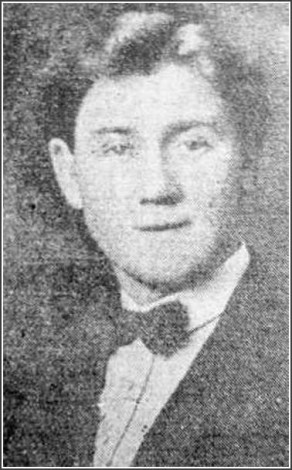
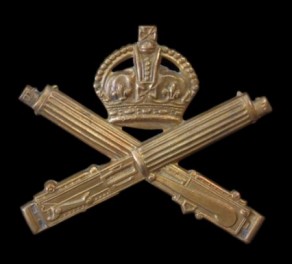
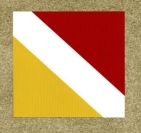

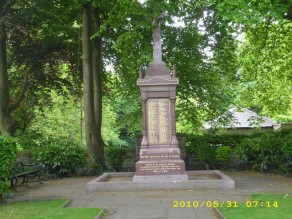
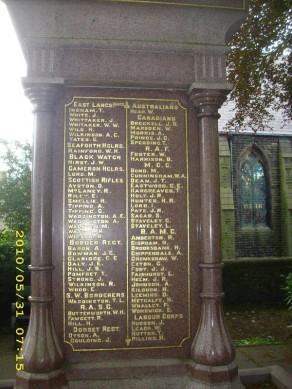




No comments yet.